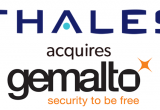Thales digital ID wallet seeks to provide one-stop tools for citizens
21 August, 2019
category: Corporate, Digital ID, Government
In an attempt to make it easier for consumers to manage the array of mobile ID credentials they are likely to possess in the near future, Gemalto parent company Thales launched the Gemalto Digital ID Wallet.
According to the company, the product “represents the next generation of Mobile ID, creating a secure, smartphone-based home for all the owner’s digital identity credentials.” This new digital ID wallet comes to market at a time when online privacy issues — not just data breaches, but questions about who owns an individual’s personal data — are attracting increasing focus from politicians, regulators and the media.
With a single click, users can authenticate themselves to fill out tax returns, pay outstanding speeding fines, get the results of medical check-ups, and so much more
Perhaps that’s one reason that in announcing the new Thales digital ID wallet, the company highlightes that the product “offers citizens complete control over their personal data, with the freedom to decide exactly what information to share, with whom, and when.” More specifically, that means “the issuer of a digital driving license, for example, cannot access data from a digital health card in the same wallet. What’s more, the solution is built on the principle of user consent.”
Providing digital ID capabilities via smartphones is not exactly new, even though the trend is certainly gaining steam, as demonstrated by certain U.S. states offering or moving to offer mobile drivers licenses — look to such states as Louisiana and Florida for recent examples of movement there — and the growing deployment of digital passports — Tanzania stands as a recent example of a country trying to do that.
Thales digital ID wallet: An “identity gateway”
Thales is striving to stand out from the field by positioning the Gemalto Digital ID Wallet as an “all-in-one identity gateway,” via is ability to support various types of credentials, and to organize them into a “single location” on a user’s smartphone.
“With a single click, users can authenticate themselves to fill out tax returns, pay outstanding speeding fines, get the results of medical check-ups, and so much more,” the statement reads. “The benefits of this immediate, 24/7 connection to public services is further enhanced by support for digital signatures, enabling contracts and other agreements to be completed, when and where it is most convenient for the user.”
Smartphone digital ID stands as one of the hottest trends in the industry, an effort fueled by ongoing but fast occurring changes in consumer behavior to favor more mobile commerce, payments and other activity.


